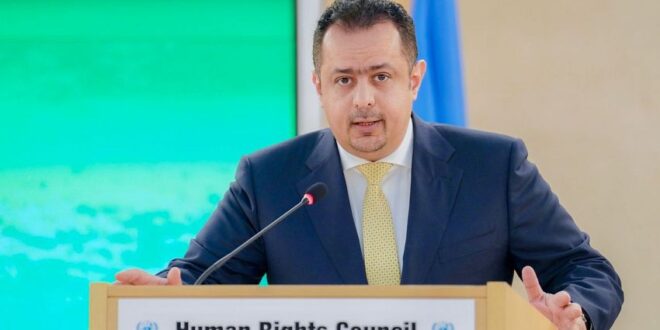Geneva – Saba
Prime Minister Dr. Maeen Abdulmalik affirmed that the human tragedy in Yemen is one of the symptoms of an extremist terrorist militia’s coup against the legitimate authority by power of guns, and a challenge to the will of the Yemeni and international community for peace.
He said that the government’s vision was and still is that addressing the real root of the crisis is to complete ending the coup and restoring the state, order, law, rights and freedoms.
This came in Yemen’s speech delivered by the Prime Minister before the opening of the 52nd session of the Human Rights Council, which began today in the Swiss city of Geneva, on the sidelines of his participation in the conference on financing the humanitarian response plan for Yemen, where he wished the session success and congratulated everyone on the 75th anniversary of the issuance of the Universal Declaration of Human Rights, which is considered a historical document and the basis for international efforts in setting standards and existing international instruments for human rights. Dr. Abdulmalik explained that Yemen was one of the first countries that dealt positively with these historical documents, and it is a party to more than 58 agreements, declarations and protocols related to human rights and international humanitarian law, and included them in its constitution and national legislation in force.
He indicated that the government sets principles and laws and human rights are at the top of its priorities, especially in light of the war that was ignited and continues to be fueled by the terrorist Houthi militia. “Our position in the government is that preserving and protecting human rights is an essential part of our commitment to our people for a just and sustainable peace that ends the war and restores security and peace to Yemen,” he said.
The Prime Minister touched on what was caused by the war imposed by a terrorist militia by the power of arms and with Iranian support against the legitimate authority, in terms of a decline in the acquired rights achieved by the state, the republic and democracy in Yemen over more than six decades…which he said the Houthi militia “replaced with a state of terrorism, killing, suppression of freedoms, attempting to impose a racist, sectarian regime alien to our Yemeni society, booby-trapping education and the minds of young people with extremist terrorist ideas, targeting the rights and freedoms guaranteed by law and order, especially women, and creating restrictive conditions to deprive them of their right to education and work. He added, “Unfortunately, we are facing a militia that does not believe in peace, but works to fuel violence and conflicts, and our experiences with it are long.
The United Nations and the international community were present with us in all its details, and witnessed how every agreement aimed at ending the suffering of the Yemeni people and preserving their rights, the latest of which was the humanitarian truce agreement under the auspices of the United Nations, failed.
The militia did not implement any of its obligations stipulated in the agreement
 Ministry of Foreign Affairs and Expatriates Official Web Site
Ministry of Foreign Affairs and Expatriates Official Web Site
